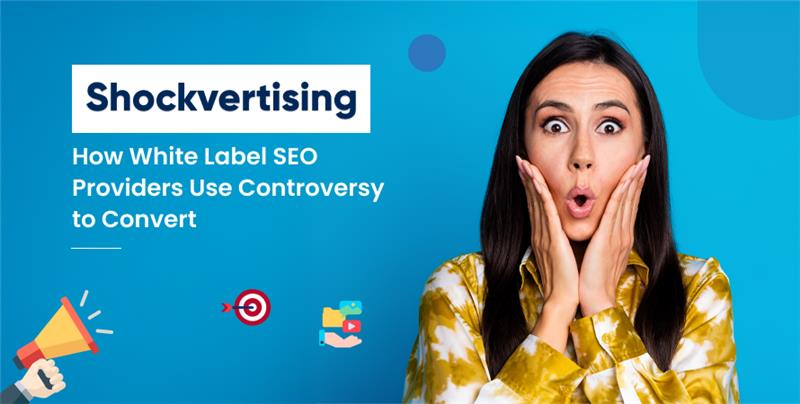Shockvertising: How White Label SEO Providers Use Controversy to Convert



In today’s hyper-competitive digital marketing world, grabbing attention is no longer just about being relevant — it’s about being unforgettable. One approach that’s gained traction for its audacity and results is shock advertising — a method that uses controversial or emotionally charged messaging to jolt audiences into paying attention.
While this tactic is more commonly seen in consumer brands, white label SEO providers are also embracing variations of it. In a space crowded with technical jargon and repetitive promises, some SEO resellers have started using shock tactics to stand out, especially when targeting marketing agencies looking for outsourced solutions.
At White Label SEO Providers, our goal isn’t to provoke for the sake of it — it’s to help agencies drive results for their clients. In this post, we explore the concept of shockvertising, how it applies in the SEO space, and whether it actually works when used by white label partners.
What Is Shock Advertising?
Shock advertising, often referred to as shockvertising, is a strategy that leverages emotionally intense, graphic, or controversial messaging to provoke strong reactions from audiences. It’s not subtle — it’s designed to interrupt the status quo and challenge conventional thinking.
Some of the most iconic examples come from brands like Benetton, which used imagery that tackled racism and social injustice, or PETA, which often creates shock ads to highlight animal cruelty. These ads succeed in sparking conversation and driving awareness, whether or not viewers agree with the message.
But what makes these campaigns effective isn’t just the controversy — it’s the shock factor that forces people to stop, think, and often, remember.
In marketing psychology, this works because human brains are wired to react strongly to unexpected or emotionally intense stimuli. When an ad breaks the mold, it commands attention — and in some cases, action.
White Label SEO: A Quick Overview
Before diving into how shockvertising ties into SEO, it’s important to understand what white label SEO is.
White label SEO is a business model where SEO providers deliver services on behalf of marketing agencies, allowing those agencies to offer SEO to their clients without doing the work in-house. The provider remains invisible, while the agency builds its brand and client relationships.
At White Label SEO Providers, we specialize in supporting marketing agencies by handling the technical and strategic side of SEO — from keyword research to link building — so they can focus on growing client relationships. It’s a partnership built on trust, consistency, and results.
Many agencies also look to us when designing campaigns that combine content, design, and messaging — which is where some explore bold marketing methods like shock in advertising to make an impact.
If you’re looking to build laser-targeted buyer personas before even considering shock tactics, check out our post on how white label agencies help build laser-targeted buyer personas.
Shock Advertising in the SEO World
In the traditional sense, SEO is about data, structure, and long-term growth. So how does a strategy like shock advertising fit into it?
While the SEO industry may not lend itself to graphic visuals or intense emotional appeals like fashion or activism, shock tactics are still used — just more subtly. Some ways white label SEO providers use these tactics include:
- Aggressive, confrontational messaging in sales copy: Phrases like “Your SEO is dead” or “Google hates your site” often grab attention by exaggerating a common fear.
- Bold claims in paid ads or landing pages: Promises like “Triple your traffic in 30 days” are intended to make prospects stop and explore further.
- Disruptive visuals in digital campaigns: Unusual graphics or disruptive layouts in ad creatives can visually “shock” the user enough to take a second look.
These strategies use a shock factor that’s tailored to the business audience — not offensive or unethical, but certainly bold enough to break the pattern of dull, templated digital marketing.
In this sense, shock in advertising becomes a psychological tool to differentiate your SEO offering in a saturated market.
Does Shockvertising Work for White Label SEO?
So the real question is — does it actually work?
The answer lies in how shockvertising is applied. When used with precision, shocking values in messaging can absolutely improve engagement. A study by the Journal of Marketing found that emotionally intense ads are more likely to be remembered and shared, especially if they provoke surprise or curiosity.
But in SEO, especially in a white label model where you’re representing another agency’s brand, the stakes are higher. A poorly judged message doesn’t just reflect on the provider — it could damage the agency-client relationship.
At White Label SEO Providers, we’ve found that shock ads are most effective when grounded in truth and value. For example, an ad that says “Your website design is killing your SEO” may be provocative, but if it’s backed by data — like site speed issues or poor structure — it becomes a powerful insight. (If you’re planning a redesign, our guide on SEO-safe website redesigns is a good starting point.)
Ultimately, shockvertising in white label SEO is not about deception — it’s about amplification. Used carefully, it can help agencies get noticed and generate more leads for their clients.
Ethical Considerations and Risk Factors
While shockvertising can be a powerful tool, it also comes with ethical and reputational risks — especially in the B2B and SEO spaces, where long-term trust matters just as much as initial clicks.
Google’s content quality guidelines explicitly discourage misleading or manipulative tactics. This is where white label SEO providers must tread carefully. Misusing the shock factor or exaggerating results can lead to broken trust, negative brand perception, or even non-compliance with advertising policies.
The principle of EEAT — Experience, Expertise, Authoritativeness, and Trustworthiness — is central here. A white label provider for agencies is often the silent engine behind multiple client campaigns. If the shock message is misleading, every brand involved can suffer.
Consider this: promising “Rank #1 in 7 days” may sound bold and eye-catching, but without solid proof, it’s misleading. Ethical marketing involves balancing attention-grabbing tactics with honest, experience-based messaging.
Let’s not forget the long game. A shock ad might bring in leads today, but it’s the quality of service and trust that retain clients for years.
At White Label SEO Providers, we stress responsible messaging, especially when building campaigns on behalf of agencies. For example, our white label copywriters use journalistic principles like the inverted pyramid to structure content that’s both captivating and factual — a great way to draw in users without relying on exaggerated or misleading claims.
When and How to Use Shock Tactics Responsibly
Using shock tactics doesn’t mean pushing boundaries for the sake of controversy. In white label SEO, it’s about applying strategic friction — creating messaging that challenges common assumptions or outdated practices without crossing ethical lines.
Here’s a simple checklist to help agencies and providers determine if a shock-based approach is appropriate:
- Is the claim backed by data or experience?
- Is it helpful, or purely sensational?
- Will it reflect poorly on a client’s brand?
- Does it meet Google’s guidelines for truthful advertising?
Responsible shock can take forms like:
- A bold case study title: “This eCommerce Site Lost 80% Traffic Overnight — Here’s Why”
- A statistic-based opener: “60% of your content is never read — are you wasting budget?”
- A fear-based lead-in that educates: “One broken redirect can ruin your SEO. Here’s how to avoid it.”
These approaches are examples of content shock — not in-your-face controversy, but a powerful moment that changes a reader’s perspective. When done well, they blend education with emotion, building engagement without breaking trust.
At White Label SEO Providers, we’ve seen agencies boost click-through rates using these precise methods — especially when paired with high-performing landing pages and blog content. You can explore more techniques in our guide on how content marketing boosts business leads.
Alternatives to Shockvertising That Still Get Attention
If your agency or clients aren’t comfortable with the risks of shock advertising, there are still effective, attention-worthy strategies to explore.
Here are a few alternatives:
- Emotion-driven storytelling: Content that evokes curiosity, hope, or urgency often performs just as well as shocking advertising examples.
- Strong, visual case studies: Show results instead of telling — these have a lasting impact.
- Relatable humor: In an industry filled with complexity, a little levity can go a long way.
- Unique data insights: Turn your own client results into exclusive insights to attract industry attention.
For example, rather than using shock advertising examples like fake countdowns or exaggerated claims, try showing how a client doubled their organic leads in 90 days — and explain exactly how it happened.
Our team at White Label SEO Providers often guides partner agencies through this more sustainable route. By focusing on long-term credibility and value-driven storytelling, you can gain attention and conversions — without relying solely on shock in advertising.
Final Thoughts
In the ever-evolving world of digital marketing, it’s clear that attention is currency — and shockvertising can buy a lot of it. But in white label SEO, where agencies trust external partners to protect and elevate their brand, there’s a fine line between shock factor and brand risk.
The most effective providers, like White Label SEO Providers, understand that shock tactics work best when they serve a purpose: to educate, inform, and spark meaningful action. Whether it’s calling out common SEO mistakes or highlighting overlooked opportunities, impactful messaging must always be rooted in value.
Ultimately, your agency’s reputation is your biggest asset. Use shock with strategy, not for the spectacle.
Frequently Asked Questions (FAQs)
Shockvertising in SEO refers to using bold, attention-grabbing messages to engage target audiences. It’s more common in B2C, but some SEO firms and white label providers use milder versions to differentiate their offerings.
Yes, if it’s misleading or violates Google’s guidelines. Even well-intentioned shock ads can backfire if they damage trust or deliver unrealistic promises.
Examples include PETA’s emotional campaigns or Benetton’s controversial imagery. In SEO, it might be a blog headline like “Your Meta Tags Are Killing Your Rankings” — provocative, but educational.
Focus on truth-based storytelling, unexpected stats, or emotionally resonant problems. Leverage formats like content marketing, inverted pyramid structure, and genuine case studies.